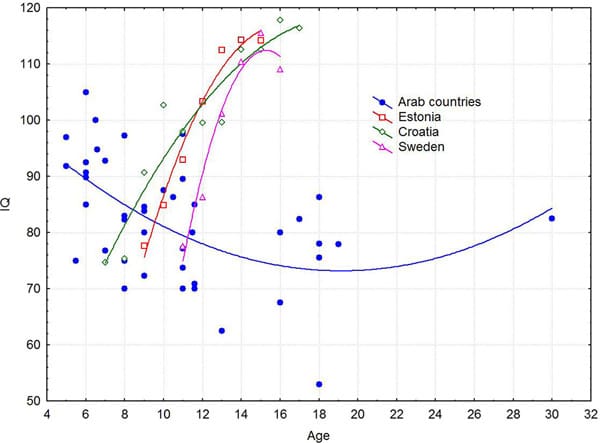Why Islam Is Both Weak and Powerful
John Jackson, American Renaissance, April 10, 2020

Edward Dutton, Why Islam Makes You Stupid . . . But Also Means You’ll Conquer the World. Washington Summit Publishers, 2020, $16.34, 210 pages.
The title neatly summarizes the thesis of this book: Islam makes people stupid but also gives them the strength to conquer the world. The author, Edward Dutton, is an English anthropologist known for his YouTube channel The Jolly Heretic and his research into various types of human differences. He earned his PhD in Religious Studies at the University of Aberdeen and has often characterized religion as an evolved set of attitudes that promote the survival of the group. In the case of Islam, though, he argues that it does so in an unusual way.

In an earlier book co-authored with British intelligence researcher Michael A. Woodley, At Our Wits’ End, Dr. Dutton argued that although millennia of evolutionary pressure increased average intelligence, a variety of factors connected with industrialization reversed this trend in the 19th century so that intelligence is now declining. In this new book, Dr. Dutton suggests that Islam has exerted a downward pressure on intelligence for a much longer time.
The Five Pillars
The Five Pillars of Islam are faith, charity, fasting, prayer, and the Hajj (the pilgrimage to Mecca). All five increase believers’ attachment to the Muslim community and so appear likely to provide an advantage over competing groups and in perpetuating Islam. This advantage is particularly noteworthy as Western societies are losing their own identities.
Fasting
Muslims are expected to fast from sunrise to sunset during the month of Ramadan. Hunger tends to decrease cognitive performance during Ramadan, and it can have a permanent effect on developing fetuses. A recent literature review noted that fasting during early pregnancy leads to worse life outcomes for the children, including “shorter lives, worse health, less mental acuity, lower educational achievement, and weaker performance in the labor market.” One study attributed 15 percent of mental disability among Muslims to fasting during early pregnancy.
On the beneficial side, as Dr. Dutton notes, religious rituals test the devotion of community members. Religious groups that do not demand much of their members often suffer from opportunistic hangers-on who enjoy the advantages of the community while contributing little. The Shakers, who were at their height in the mid-18th century with about 5,000 community members, suffered from “winter Shakers.” They claimed to share Shaker beliefs and sought food and shelter in winter, only to disappear in the spring.
Islam solves this problem with particularly demanding rituals through which believers assert their commitment and exclude anyone who is not truly dedicated. In addition to fasting, there is a schedule of prayers. It is traditional to pray five times daily, including once very early in the morning, even at the cost of losing sleep. Calls to prayer are broadcast loudly in Muslim lands, which make believers stop whatever they are doing for 10 to 15 minutes and pray.

Faith
Dr. Dutton notes the anti-intellectual trends in Islamic society. One is an emphasis on rote learning and unquestioning faith. Traditional Islamic instruction does not encourage critical analysis. Independent interpretation of scripture is known in Arabic as ijtihad, and has been explicitly rejected by Sunni Muslim religious authorities since the 11th century. Dissident Muslims risk arrest, exile, or death. This type of enforced conformity discourages Muslims from developing their intelligence to its full potential but gives them an advantage in conflicts with more individualistic groups. Muslim fanatics are more confident than agnostic Westerners and less likely to lose faith in their cause.
Marriage customs
Another factor that distinguishes the Muslim world is the prevalence of cousin marriage. Although there is a prohibition on incest in Islam, the definition of incest is narrow; marrying a cousin does not qualify. Muhammad himself married a first cousin, and most Muslims take the Prophet’s life as an infallible model. For this and other cultural reasons older than Islam itself, the practice is much more common in Muslim countries than in most of the world.
Of course, because people get along best with those similar to themselves, many couples around the world have genetic similarities. However, consanguineous marriages are much more common among Muslims. Only about 6.5 percent of couples in the world are in such marriages, but in Jordan, Kuwait, Qatar and the UAE, the majority of couples are. In Pakistan, more than 60 percent of marriages are to first or second cousins. These practices continue among immigrants to the West. A 2013 analysis found that in the English city of Bradford, 37 percent of ethnic Pakistanis are the children of first-cousin marriages, and earlier estimates were even higher.
Consanguinity increases the rate of various genetic problems, including hemophilia, deafness, and depression. The 2013 research found that consanguinity nearly doubled the risk of birth defects in British Pakistanis. In 2005, the BBC reported that Pakistanis were 3 percent of the UK population but accounted for close to a third of children with recessive genetic disorders.
Inbreeding is also associated with low IQ. In one study in India that compared inbred with non-inbred families, the practice was connected with an IQ deficit of 20 points and more than double the rate of severe mental retardation. In research by Dr. Dutton’s colleague Michael Woodley, national IQ across 72 countries has also been found to correlate negatively with rates of cousin marriage.

The Grand Mosque in the Islamic holy city of Mecca. (Credit Image: © Rana Sajid Hussain / Pacific Press via ZUMA Wire)
On the other hand, cousin marriage promotes group identity, which is an advantage in conflicts with other groups. According to genetic similarity theory, people are more inclined to sympathize with and act altruistically toward those closer to them genetically. This behavior helps people pass on genes similar to their own. People who practice cousin marriage are genetically closer to each other than people who do not. Thus, it tends to make a population identify more strongly with its own people and defend their interests more vigorously.
Suppression of women
The subjugation of women holds Muslim societies back. The most obvious factor is that many Muslim women never attend school and are kept in seclusion by male family members, so they lack opportunities to cultivate their abilities. However, another factor Dr. Dutton suggests is female genital mutilation, which is intended to suppress women’s sexuality. This practice is more prevalent in some Muslim countries than others, but it is almost universal for girls in Somalia, Sudan, and Egypt. The procedure can be traumatic, and childhood trauma is associated with lower IQ. Finally, veiled women who rarely go outside get so little sunlight that they suffer from vitamin D deficiency. Dr. Dutton hypothesizes that this deficit harms the development of their fetuses’ brains during pregnancy.
Low IQ and environmental stress strengthen ethnocentrism and religiosity
It is important to note just how low IQs in the Muslim world are, and thus how out of place most Muslims would feel in the West, other cultural differences aside. Dr. Dutton and several colleagues conducted a literature review on IQs in Arab countries, and found that, compared to Europe, the IQs of children do not greatly increase with age and may even decline. According to 2019 estimates, the average adult IQ in Pakistan is 80, and in Bangladesh it is 76.

The average Arab at age 30 would be at the 12th percentile for IQ among white Americans.
Bakhiet et al. (2018) found that Arabs have a mean IQ of 92 at the age of six, and suggested that Muslim education may be responsible for the subsequent decrease. But even without this decrease, the average Arab would find his intelligence on par with that of the average criminal offender in the US.
Dr. Dutton argues that both ethnocentrism and religiosity increase in response to stress. Thus, the stress of living in a poor, violent, or despotic country can make Muslims more dedicated to Islam. Indeed, anything that decreases average IQ could increase these traits, because a less intelligent society is more stressful to live in. If this is true, contrary to the hopes of many Westerners, Muslims may not be driven by hardship to give up their beliefs.
Conclusion
This book does not follow conventions of organization; its style is sometimes rambling and rushed, and it sometimes lacks empirical evidence. Nevertheless, Why Islam Makes You Stupid is an interesting, if somewhat speculative, contribution to our understanding of a culture of increasing importance to Europeans. I recommend it to anyone who wonders why Islam, with its stifling set of rules, nevertheless persists and even poses a challenge to the West.















